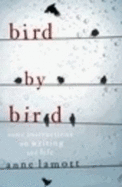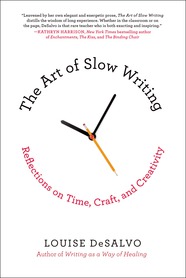Juicy Pens, Thirsty Paper
 I am making a modest attempt to give away more books. It’s slow, as I usually want to read them first, or to reread them. This week it is Juicy Pens, Thirsty Paper, by Sark, which I am sending to my friend Michelle. Juicy Pens is printed just as the author wrote it — in blazing, full color. Her journey is all about growing to appreciate herself in all her originality, and how she found readers (first) and then a publisher. How she gave it all up for art and writing, living as a young adult in a magic cottage that she rented for $500 when she didn’t have that much money. (Secret=hand-drawn posters.)
I am making a modest attempt to give away more books. It’s slow, as I usually want to read them first, or to reread them. This week it is Juicy Pens, Thirsty Paper, by Sark, which I am sending to my friend Michelle. Juicy Pens is printed just as the author wrote it — in blazing, full color. Her journey is all about growing to appreciate herself in all her originality, and how she found readers (first) and then a publisher. How she gave it all up for art and writing, living as a young adult in a magic cottage that she rented for $500 when she didn’t have that much money. (Secret=hand-drawn posters.)
Not all of us are brave enough to live a life devoted to art. Let alone capital-A Art. Some of us have families, or jobs we love. Some of us would spend so much time worrying about money, if we hadn’t a day-job, that the sacrifice would scarcely be worth it. But, if writing is important to you, then Sark would still encourage you to find places in the interstices of your life in which to write. Fifteen minutes. Forty-five minutes. “Writing only leads to more writing.” You don’t need to live in a magic cottage in order to experience magic. As her chapter one title suggests: “Wings on Your Pens and Fingers.”
My introduction to Sark’s work came (many years ago) from my students. I am happy to pass on that recommendation to you.


 I should have reminded you that my use of “shitty first draft” comes from Anne Lamott’s splendid writing book, Bird by Bird.
I should have reminded you that my use of “shitty first draft” comes from Anne Lamott’s splendid writing book, Bird by Bird.  Begin Again is the title of Grace Paley’s collected poems, and excellent advice — generally — for pursuing any creative career. (Click
Begin Again is the title of Grace Paley’s collected poems, and excellent advice — generally — for pursuing any creative career. (Click 

 keep working, that time will come. This is miracle time, magic time, the move from opacity to clarity. And we can’t force this moment — the arrival of clarity — to happen; this moment takes its own sweet time. We have to show up at the desk day after day, week after week, year after year for that splendid moment to arrive. (148-149)
keep working, that time will come. This is miracle time, magic time, the move from opacity to clarity. And we can’t force this moment — the arrival of clarity — to happen; this moment takes its own sweet time. We have to show up at the desk day after day, week after week, year after year for that splendid moment to arrive. (148-149)